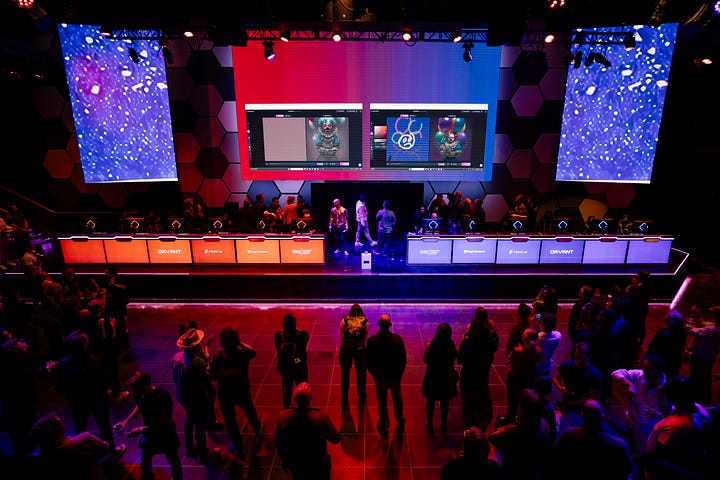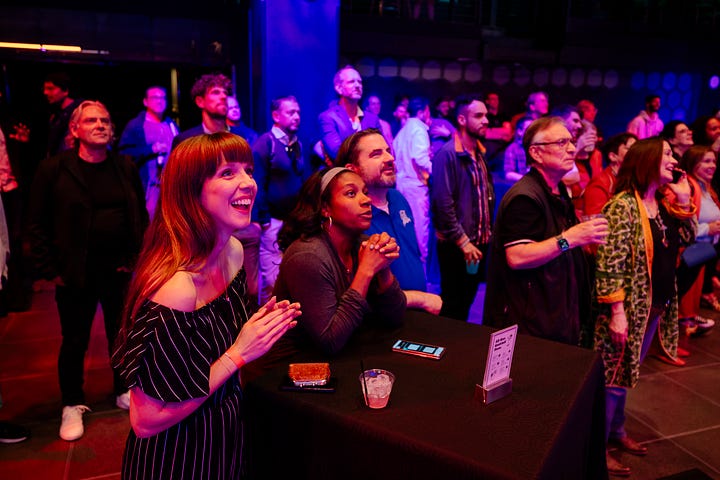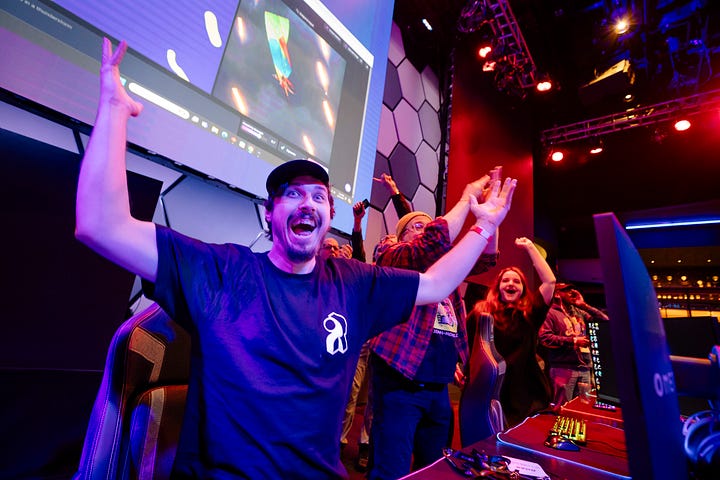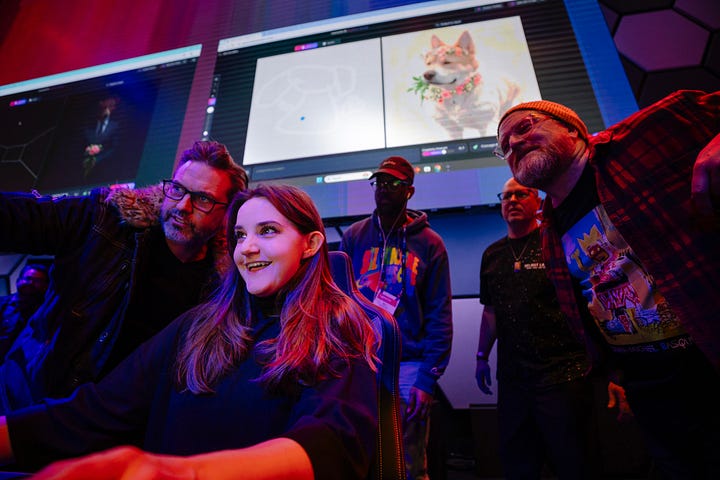The Art of Making Film Is Not The Art of Making Film
A writer wins a generative AI eSports tournament. Now what?
The morning I drive to Las Vegas to compete in a generative AI eSports tournament, I receive a call that my TV pilot is being dropped from development. My passionate producer, who poured his own time and energy into nurturing my idea, explains to me that the mandate has changed and buyers are being finicky. I’m not surprised. The writer’s strike last year succeeded with many of its demands, but here on the other side, opportunities are thinning. Every day I scan Deadline and Variety, reading about how the industry I pledged myself to years ago is hemorrhaging on all sides. Each news cycle reveals another whisper indicating that Hollywood (as we used to know it) is on life support. As I head east from Los Angeles into the desert, I get a sense that I’m abandoning an old regime for a new wild west. By the time I walk into the HyperX Gaming Arena, squeezing through the crowd of over 400 AI enthusiasts, I’ve forgotten about the pilot entirely.
Less than a year ago, I began learning about AI’s capabilities for filmmaking because it was a relevant topic during strike negotiations. Rather quickly, I realized no one has ever succeeded by fighting against an emergent technology, especially not one that cuts production costs. The five biggest box office flops of 2023 had a combined loss of over 700 million dollars. As much as I wholeheartedly supported both unions who negotiated on behalf of writers and actors last year, securing better benefits for those of us in creative roles, I found myself wondering how any of us were going to get paid, let alone succeed, if the industry continues to be hit with record-breaking losses.
On my long drive through the desert, I talk to a showrunner friend who laments about the good old days, when he was given a budget large enough to employ 20 writers per room. Now he’s lucky to hire 4, and none of them are low-level staff writers like me and my peers. As a mentor, he’s not sure how to nurture new voices or positively impact the next generation of TV writers. There’s no money to hire us, and it’s too much of a risk to give an “inexperienced” writer one out of four available slots in a writer’s room. He’s not the first to tell me this. I can count on two hands the number of showrunners I’ve connected with over the last three years who tell me they’d love to hire me, but there just isn’t money left over for low-level writers. As a result, my trust in “the process” is worn thin. Tenacity, merit, and hard work aside, the challenges this industry currently faces are foundational, and they have nothing to do with me and my desire to create. When I cross the Nevada state line, I decide I no longer want to bang on closed doors.
In the AI community, the doors are wide open. Everyone I speak with is excited for the future. We exchange stories about what led us here. I meet VFX artists, animators, graphic designers, executives and directors who are choosing to embrace AI. We talk about how fast things are moving, and how, perhaps ironically, this feels like a wonderful time to be a creator. Moments before the tournament begins, I say hi to Shelby Ward, co-founder of Curious Refuge, the reason we are all gathered here in Vegas tonight. The tournament is part of Curious Refuge’s AI Filmmaking Mega Party, which proves to be a celebratory, inaugural moment for those of us who have only interacted with each other over Discord. There is a deeply human element to this experience I’m having, and as I run onto the gaming stage with my fellow competitors, I glance at the row of computers and keyboards lined up like athletic gear, smiling.


The tournament features a gamified version of Leonardo.ai. We use the realtime canvas tool to improve and adjust the prompts we’re given, all under 60 seconds. After a few rounds, I realize if the judges are locked in a tie, the winners of each round will be chosen by audience vote. I start to engage directly with the people watching, making eye contact. I’ve spent enough time as a performer to realize how important it is to build a relationship with your spectators. I strategically save my best edits for the final few seconds of each round, pulling off a game-changing improvement before the buzzer. Winning the tournament and taking home an Apple Vision Pro isn’t the only reason I feel encouraged to keep going into the world of AI. Deep within myself, I can tell I am gravitating towards what is moving, growing and expanding.
When I get home from the tournament, I watch Light & Magic, a six-part series that explores the special effects company George Lucas created to make some of the first Star Wars films. I get chills when I listen to the practical effects designers talk about how they had to invent systems and physical rigs to accomplish the shots Lucas wanted, because none of it had ever been done before. I see AI filmmakers taking similar leaps, trying things that haven’t been done before and perhaps most excitingly, updating the workflow of the filmmaking process itself. After the making of Episode IV, Lucas asks most of the designers who worked on it to join for The Empire Strikes Back. But this time, the team isn’t going to work with physical models or miniatures anymore. Instead, they have to learn how to use computers. Several of the artists felt like something was lost in this process, that modelmaking was the true way to create art, and computers were a cheap shortcut. You can see the disappointment in some of their eyes. After all, these people had developed an intimate and enjoyable relationship with their craft, painting tiny set pieces, building and constructing physical objects. Without this tactile connection to their work, some of the designers felt filmmaking had lost its integrity.
I have compassion for these artists, because I hear the same strife from film purists today. For many, the process of making films is highly sentimental. Historically, filmmaking has been an expensive, time consuming, grueling and emotionally difficult process in which many people take considerable pride. Withstanding the pressure of working in entertainment requires a high tolerance for rejection. It is, after all, nothing short of a miracle when a film actually gets made. When it comes to AI, an understandable kind of defensiveness is emerging around what does and does not qualify as “filmmaking”. But if anything, the disruptive elements of having an AI-powered workflow spark a conversation about the relationship between process and product. As seen with Lucas’s work, it would seem the art of making film is not the art of making film, but instead a never ending, creative evolution of storytelling that parallels the development of new technology.
The deeper I go into AI, the more it feels like leaving Plato’s allegory of the cave. I can’t adhere to the traditional process of filmmaking anymore, because I’ve seen ways to streamline it that disrupt the entire production pipeline. It is not the appeal of doing something easier or faster that pulls me towards AI. It’s the unreliability and inefficiency of the entertainment industry that does. These tools allow creators to ideate projects that would typically be kept behind locked doors. We can now “fail fast and early”, just like Paul Trillo, accomplished storyteller and director of the first music video developed with SORA, said during the panel at Runway's second annual AI International Film Festival. I look to AI’s non-artistic capabilities to imagine its future impact on the lives of creative people. I notice that AI is being used to streamline workflows across industries, and entertainment is no exception. The reason I’m not worried is because our strength as storytellers is not threatened by AI’s capabilities, it’s enhanced by them.
I open the PDF file of my TV pilot, wondering how my future pitches will evolve beyond the prescriptive structure of selling a TV show. I feel the limitations of the past fall away, a wall of ones and zeroes parting like the sea, revealing a future where my relationship to creative storytelling finally expands beyond the limitations of traditional filmmaking. There’s no doubt the output at next year’s AI eSports Tournament will be light years ahead of what we did in Vegas this spring. As for my own generative AI skills? Well, I’m getting better, but I’m no Leonardo (pun intended).


Photography by Wade Vandervort
Stay tuned for more thoughts, ideas & reflections on AI and the future of entertainment.




I thought the piece was well written Jagger! The tie back to Lucas was a nice touch. Honestly I don't even understand what a "generative AL eSports tournament" means....
I hear you, and can definitely tell you're trying to have a balanced approach.
Even though I use AI everyday, I'm still on the fence.
I'm excited for AI and what it can do for medicine, but when it comes to other trivial jobs (one of which I hold myself) I don't see how the good outweighs the bad, other than cost reduction. It's opening up a Pandora's box we're too greedy to close.
I don't trust people, I don't trust our motivations, I don't trust we can build this "the right way" - just look at social media. I really don't see how this will lead us to having more free time because "robots" will do our jobs. For hundreds of years we've been creating tools to ease human labor and delegate work, yet somehow, more keeps piling on. The technology is incredible and I'm curious about it myself, but we can't even agree on recycling, how are we ever going to agree on something so impactful as AI?
“We’ll go down in history as the first society that wouldn't save itself because it wasn't cost effective.” – Kurt Vonnegut